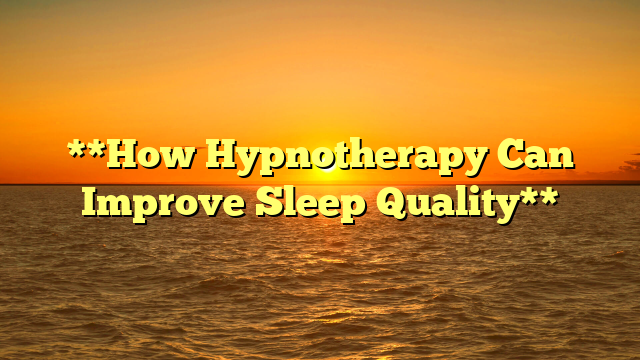
Sleep is essential for overall well-being, yet millions of people struggle with insomnia, restless nights, and poor sleep quality. While conventional treatments such as medication, cognitive-behavioral therapy (CBT), and lifestyle changes are commonly recommended, **hypnotherapy** has gained attention as a natural and effective approach to improving sleep. But how does hypnotherapy work, and what does science say about its impact on sleep quality?
**Understanding Hypnotherapy for Sleep Improvement**
Hypnotherapy is a technique that guides individuals into a **state of deep relaxation and focused awareness**, making the subconscious mind more receptive to positive suggestions. In the context of sleep, hypnotherapy helps individuals:
– **Calm the mind and body** to promote relaxation before bedtime.
– **Reduce anxiety and stress**, which are major contributors to insomnia.
– **Reprogram negative thought patterns** related to sleep, such as fear of not being able to fall asleep.
– **Enhance natural sleep rhythms** by reinforcing positive sleep habits.
Unlike sleep medications, which may have side effects or lead to dependency, hypnotherapy works naturally to **train the brain to sleep better** over time.
**Scientific Evidence on Hypnotherapy and Sleep**
Research has shown that hypnotherapy can effectively improve sleep quality. Some key findings include:
– A **2014 study published in Sleep** found that **hypnosis increased slow-wave sleep (deep sleep) by 80%** in participants compared to those who did not receive hypnosis. Slow-wave sleep is crucial for physical and mental restoration.
– A ** bayar 4d -analysis in the International Journal of Clinical and Experimental Hypnosis** concluded that **hypnotherapy significantly improved sleep onset and duration** in individuals with insomnia.
– A **2017 study in the Journal of Clinical Sleep Medicine** found that hypnosis **helped reduce nighttime awakenings and improved overall sleep efficiency**.
– Research at **Stanford University (2020)** suggested that individuals who regularly practiced hypnosis for sleep **reported lower levels of stress and anxiety, leading to better sleep quality**.
These findings suggest that hypnotherapy is a **scientifically supported** approach to improving sleep without the need for medication.
**How Hypnotherapy Works for Sleep Disorders**
Hypnotherapy can help treat various sleep disorders, including:
1. **Insomnia** – By addressing stress, anxiety, and racing thoughts that keep people awake, hypnosis helps the mind relax for sleep.
2. **Sleep Anxiety** – Some individuals develop a fear of not sleeping, which worsens their condition. Hypnosis helps break this cycle.
3. **Nightmares and Night Terrors** – Hypnotherapy can reduce the frequency and intensity of distressing dreams.
4. **Sleepwalking and Parasomnias** – Hypnosis has been used to modify subconscious behaviors that disrupt sleep.
5. **Shift Work Sleep Disorder** – Hypnotherapy can help individuals **adjust their internal body clock** to improve sleep patterns.
**Techniques Used in Sleep Hypnotherapy**
A trained hypnotherapist may use several techniques to improve sleep, including:
– **Guided relaxation** to ease the body into a state of calm.
– **Visualization exercises** to create a peaceful mental space before sleep.
– **Positive affirmations** to reinforce confidence in falling and staying asleep.
– **Breathing techniques** to slow the heart rate and promote relaxation.
– **Self-hypnosis training** to allow individuals to continue practicing hypnosis at home.
**Is Hypnotherapy Right for You?**
Hypnotherapy is a safe and natural approach that can be beneficial for those who:
– Struggle with chronic insomnia.
– Experience stress and anxiety that disrupt sleep.
– Want to improve sleep without relying on medication.
– Are open to relaxation techniques and subconscious reprogramming.
Hypnotherapy offers a **powerful and natural solution** for improving sleep quality by reducing stress, enhancing relaxation, and retraining the subconscious mind. Backed by scientific research, it serves as a promising alternative or complementary treatment for those struggling with sleep disorders. If you are seeking **a drug-free, lasting approach to better sleep**, hypnotherapy may be the key to unlocking restful nights and improved well-being.





